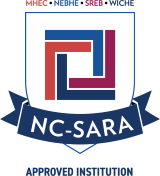
State Authorization
Quick Links
The State Authorization Reciprocity Agreement (SARA) is a voluntary agreement among its member states and U.S. territories that establishes comparable national standards for interstate offering of postsecondary distance education courses and programs. It is intended to make it easier for students to take online courses offered in other states, to give them confidence that programs in other states are properly authorized, and thus to improve the quality of online education.
The National Council for State Authorization Reciprocity Agreements (NC-SARA) oversees SARA. Forty-nine states (all except California) currently participate in NC-SARA. NC-SARA operates under the authority of four regional education compacts: the Midwestern Higher Education Compact, the New England Board of Higher Education, the Southern Regional Board and the Western Interstate Commission for Higher Education. North Carolina is one of 16 states in the Southern Regional Education Board compact.
 Carteret Community College was approved in 2017 by SARA-North Carolina to participate in NC-SARA. Though California is not a member of SARA, Carteret CC is able to offer online education in California by means of exemption from authorization.
Carteret Community College was approved in 2017 by SARA-North Carolina to participate in NC-SARA. Though California is not a member of SARA, Carteret CC is able to offer online education in California by means of exemption from authorization.
SARA Student Complaint & Grievance Process
In addition to ensuring that institutions are authorized to offer academic programs in other states, the National Council for State Authorization Reciprocity Agreements (NC-SARA) provides a pathway for students in all states to submit complaints (also known as grievances). Initial responsibility for the investigation and resolution of complaints resides with the institution against which the complaint is made. Further consideration and resolution, if necessary, is the responsibility of the SARA Portal Entity, and other responsible agencies of the institution’s home state. Examples of consumer protection complaints for SARA purposes include, but are not limited to:
- Veracity of recruitment and marketing materials;
- Accuracy of job placement data;
- Accuracy of information about tuition, fees and financial aid;
- Complete and accurate admission requirements for courses and programs;
- Accuracy of information about the institution’s accreditation and/or any programmatic/specialized accreditation held by the institution’s programs;
- Accuracy of information about whether course work meets any relevant professional licensing requirements or the requirements of specialized accrediting bodies;
- Accuracy of information about whether the institution’s course work will transfer to other institutions; and
- Operation of distance education programs consistent with practices expected by institutional accreditors (and, if applicable, programmatic/specialized accreditors) and/or the Council of Regional Accrediting Commissions (C‐RAC) Guidelines for distance education.
Student complaints, including claims that their rights under law or College policy have been violated, may be resolved by a two-step process.
Step 1 – All Students:
- The initial responsibility for resolving the complaint resides with the institution. Your first step as a student, regardless of residency, is to follow the complaint process outlined in Carteret CC’s Student Grievance Policy 3.15 (please click on the Student Complaints link).
For questions about the student complaint process for Online and Distance Education courses or programs at Carteret Community College, please contact the Dean of Student Services, Lewis Stroud by mail (3505 Arendell Street, Morehead City, NC 28557), email ([email protected]), or phone (252.222.6021).
Step 2 – Your Residency Determines Your Next Step:
- Most Out-of-State Students: If your complaint is not resolved at the institutional level (Step 1), then out-of-state students residing in National Council for State Authorization Reciprocity Agreement (NC-SARA) states, which includes all states except California, may submit complaints to SARA-North Carolina. SARA-North Carolina operates under NCSEAA (North Carolina State Education Assistance Authority). Access the Complaint Form (PDF) at SARA-North Carolina Student Complaint Process web page.
Contact Information for NCSEAA c/o SARA North Carolina:
P.O. Box 41349
Raleigh, NC 27629
Toll free: 855.SARA.1.NC (727.2162)
Local: 919.549.8614, ext. 4667
Email: [email protected]
- North Carolina Residents: If your complaint is not resolved at the institutional level (Step 1), then you may refer your complaint to the North Carolina Post-Secondary Education Complaint Process of the Licensure Division of the University of North Carolina System Office. The policy is at Student Complaint Policy (PDF); the complaint form is at Student Complaint Form .
Contact Information for North Carolina Post Secondary Education Complaints:
North Carolina Post Secondary Education Complaints
c/o Student Complaints
University of North Carolina System Office
223 S. West Street, Suite 1800, Raleigh, NC 27603
Phone: 919.962.4550
Additional Resources for Student Complaints
- Consumer Protection Division of the North Carolina Department of Justice. To file a complaint with the Consumer Protection Division of the North Carolina Department of Justice, please visit State Attorney General’s File a Complaint, and click on the General Consumer Complaint Form under the section “Complain Online.” Visit North Carolina Department of Justice for a more comprehensive overview of services.
Complaints can be mailed to:
Consumer Protection Division
Attorney General’s Office
Mail Service Center 9001
Raleigh, NC 27699-9001
For telephone assistance:
Toll-free within North Carolina: 1-877-5-NO-SCAM
From outside North Carolina: (919) 716-6000
En Espanol: (919) 716-0058
- Southern Association of Colleges and Schools Commission on Colleges (SACSCOC). SACSCOC expects individuals to attempt to resolve the complaint through all means available to the complainant, including the institution’s grievance procedures, before submitting a complaint to SACSCOC. Complete information about the SACSCOC process is at Complaint Procedures Against the Commission or its Accredited Institutions (the complaint form is on the last two pages).
Southern Association of Colleges and Schools Commission on Colleges
1866 Southern Lane
Decatur, Georgia 30033-4097
Phone: 404.679.4500
Contact: http://sacscoc.org/about-sacscoc/faqs/
- State Portal Entity Contacts. NC-SARA provides a complete list of relevant agencies with contact information for each NC-SARA state.
National Council for State Authorization Reciprocity
3005 Center Green Drive, Suite 130
Boulder, Colorado 80301
Phone: 303.848.3275
Email: [email protected]
Contact: https://nc-sara.org/state-portal-entity-contacts
